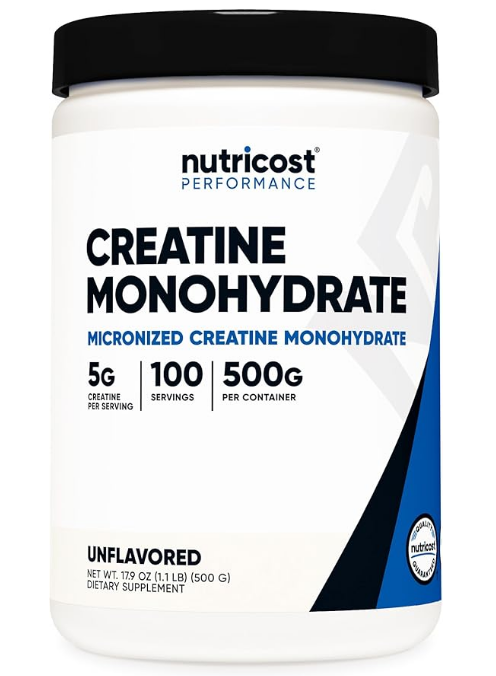I started running and taking creatine in December after reading extensively about its benefits, especially as we age. I had previously taken the Beachbody creatine but did not understand when and how to take it. Since it was removed from the product line, I went on Amazon, saw Nutricost Creatine, read the reviews and decided to try it.
It is now almost three months of taking it correctly, and the effects are excellent. Better endurance, better leg strength, and quicker recovery. It has been a very positive addition to my diet. To learn more about the benefits of taking creatine for runners, scroll down.
The Runner’s Guide to Creatine: Benefits, Myths, and How to Use It
Creatine has long been associated with power athletes, bodybuilders, and sprinters. But what about distance runners? Is creatine beneficial for endurance athletes, or is it just for those looking to pack on muscle? In this guide, we’ll break down the benefits, dispel common myths, and explain how runners can use creatine effectively.
What is Creatine?
Creatine is a naturally occurring compound found in muscle cells that helps produce energy during high-intensity activity. The body produces creatine from amino acids, and it’s also found in foods like red meat and fish. However, many athletes supplement with creatine monohydrate to maximize their stores.
Benefits of Creatine for Runners
While creatine is often linked to short bursts of strength and power, endurance athletes can also benefit in several ways:
- Improved Sprint Performance – Even distance runners need to sprint at times, whether for a race finish or interval training. Creatine enhances ATP production, improving short bursts of speed and power.
- Better Recovery – Creatine has been shown to reduce muscle cell damage and inflammation, potentially leading to faster recovery between workouts and races.
- Increased Glycogen Storage – Some research suggests that creatine supplementation can enhance muscle glycogen storage, providing a valuable energy reserve for long runs.
- Improved Hydration – Creatine draws water into muscle cells, which may help with thermoregulation and hydration during endurance events.
- Reduced Fatigue – By buffering muscle acidity and enhancing ATP production, creatine can help delay fatigue, especially in high-intensity training blocks.
Common Myths About Creatine and Running
- Creatine Will Make You Gain Too Much Weight – While creatine can cause slight water retention in muscles, this is not the same as fat gain. Most runners experience negligible weight increases that do not impact performance negatively.
- Creatine is Only for Strength Athletes – While power athletes benefit from creatine, endurance athletes can see improvements in sprint performance, recovery, and fatigue resistance.
- Creatine Causes Dehydration or Cramps – Studies have found no link between creatine supplementation and increased muscle cramping or dehydration. In fact, it may aid hydration.
How to Take Creatine as a Runner
If you’re a runner interested in trying creatine, follow these simple guidelines:
- Stick to 3-5 grams per day – A daily dose of creatine monohydrate (3-5g) is sufficient. Loading phases (20g per day for a week) are not necessary for most endurance athletes.
- Take It Consistently – Creatine works best when taken regularly, as it takes time to saturate muscle stores.
- Stay Hydrated – Since creatine draws water into muscle cells, ensure you’re drinking enough fluids throughout the day.
- Pair It with Carbs or Protein – Taking creatine with a carbohydrate or protein source may help improve absorption.
Final Thoughts
Creatine isn’t just for bodybuilders—it’s a valuable tool for runners looking to improve performance, recovery, and fatigue resistance. If you’re training hard and looking for an edge, creatine may be worth adding to your routine. As always, consult with a healthcare professional before starting any new supplement.
From ChatGPT

